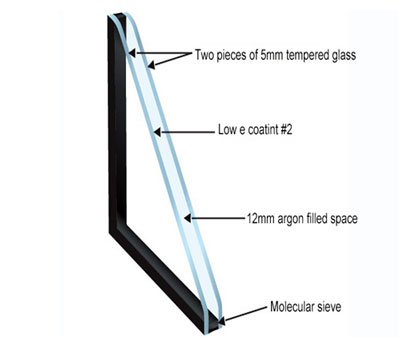Insulated Glass

- Insulated Glass, often called double glazing, is a combination of two or more panes of glass spaced apart with a spacer bar and hermetically sealed with a primary and secondary sealant to form a single unit with one or more air spaces in between.
- Thermal Properties: The U value is effectively lowered by insulating glazing and can be further reduced by filling of inert gases, generally increasing cavity thickness and using inert gas like Argon to further improve thermal insulation.
- Acoustical insulation: Insulating glazing can reduce noise by about 30dB (5mm glass- 12mm air gap -5mm glass) and further reduction is obtainable by using asymmetrical combination and using laminated glazing.
- Condensation: IGU reduces the probability of condensation formation compared to monolithic glass.
- Sealing: Two glasses are separated by a spacer which is generally made of aluminum; primary sealant and secondary sealant are used for air and water tightness.
Applications of IGU:
Insulating glass (IG) units are used in a wide range of applications including:
- Commercial/Residential Fixed and Operable windows
- Curtain Walls
- Storefronts
- Sloped/Overhead Glazing
- Non-vision (Spandrel) Locations
Benefits of Insulating Glass:
Perfect Transparency: Insulated glass units help in reducing the incidence of condensation on the warm air side and bring about transparency. IG can be used in larger glazed areas without increasing energy consumption and still bring about perfect transparency. For example, insulated glass is used in soft drink chillers in retail stores, airports, etc.
Sound Insulation: Monolithic glass resonates when high frequency sound comes in because it cannot withstand the high frequency. IG units are highly effective in reducing sound transmission. Air inside the IG will prevent the resonance from passing through. For example, buildings near airports, railway stations, and main roads are constructed using IG to prevent noise from entering the building.
Reduced Infiltration: In cold climates, the aim is to reduce infiltration of the cold, maintain internal heated temperature and reduce the cost of heating.
Reduced Condensation: Water from condensation build-up and the resultant water run-off can damage window sills and frames, and seep into walls and adjoining areas. Condensation will form when the moisture in the air condenses out on surfaces that are cooler. Window surfaces being colder than other surfaces in the building are more prone to condensation build up. An IGU reduces the likelihood of condensation forming by providing a thermal barrier between the inside and the outside.

